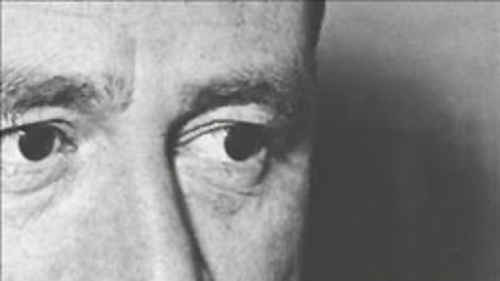mercredi, 27 avril 2016
Why Carl Schmitt Would Oppose the War on Terror (Probably)

Why Carl Schmitt Would Oppose the War on Terror (Probably)
Every now and then on Twitter I type in the name “Carl Schmitt” and see what’s up with the social media discussion on the German jurist. Invariably, there are new book releases and papers out; there are upcoming conferences; of course quotes from the great man; and even some humour. With every ying there’s a yang, however, and Schmitt does not get a ‘free ride’ on the Twitter-sphere. Of course, Schmitt did take a walk on the dark side and a Twitter search will invariably reveal some unpleasantries directed in Schmitt’s direction or even in the direction of his supporters. There not only are the to-be-expected spurts of invective: some people, trying to make sense of the increasing securitization of the globe and the seemingly 24/7 merry-go-round (if ‘merry’ is the appropriate word) news coverage of the War on Terror, accuse Schmitt of providing the intellectual armoury for the current trajectory the world hurtles on.
Because of his image, Schmitt is one of the fall-guys for some of those deeply unhappy with the War on Terror. As students of politics are aware of, Schmitt has a reputation for exalting conflict and sacrificing diversity for the sake of fashioning a coherent national narrative. He also has a reputation for favouring authority and order and thus for preferring authoritarianism to a messy pluralism. And above all, Schmitt is known as someone for whom law was a secondary concern and for whom there was always a higher purpose that could be found above legalism.
When one then looks around and observes the changes that have occurred in Western countries over the last 15 years – bearing in mind that these changes succeeded a period of intense optimism (thus leaving a sour taste in the mouth) – it then is a small step to draw a genealogy of increasing erosion of civil liberties and indicting Schmitt as the founding father of this genealogy.
What is remarkable about the popularly held views about Schmitt is that they are broadly correct factually, but tell us next to nothing about Schmitt’s core values and beliefs and thus are of little use in trying to decipher how Schmitt would have viewed the War on Terror. It’s true that Schmitt wasn’t shy of conflict, supported the German President to the extent of trying to clothe him in the robes of Caesarist dictatorship, that he persistently advocated a solid national identity (although he stopped far short of the racial propaganda of the National Socialists) and that he often chided parliamentarians and liberals for being so officious in their adherence to written law.
Yet Schmitt was really ‘not about’ existential conflict or brutal repression per se. His primary concern was with the substance, or lack thereof, of human existence. We can understand Schmitt’s general thinking on matters like law and authority far better if we concentrate on the purpose of his meditations on such matters, rather than the meditations themselves.
In books like Roman Catholicism and Political Form Schmitt demonstrated that Europe, in spite of all its advances in economics and the sciences, had lost the transcendental element which corporations like the Church still possessed. It was therefore mired in nihilism and radical negation. This view became more evident by the late 1920s in his lecture The Age of Neutralizations and Depoliticisations where he contrasted the vitality of the Soviets with the lethargy that had beset Western Man. Schmitt’s concern for the integrity of human existence was picked up quite astutely by Leo Strauss in his famous commentary on The Concept of the Political. It also emerges at a later date when he wrote about international law and relations. Here he questioned the validity of allowing non-European nations enter a modified public order that had been designed for those of a European outlook: how could the Japanese and Turks internalize a culture that was alien to them and how could they then have that necessary ‘love’ for it?
As an antithesis to the substantive nature of bodies like the Church or the invigorating effect of national loyalty, Schmitt cited the modern tendency to neutralize all inherently human problems by either plunging into endless compromises and discussion or (and this is most relevant to the War on Terror) evoking the concept of humanity. This facile humanity then called out for apolitical solutions to material problems, as opposed to political expressions of the human condition. Schmitt derided the common tendency of the Soviets and Americans to seek an electrification of the earth and more generally was horrified at the thought of globalisation, which for him was manifested in finding technical solutions to problems, solutions and problems that all humans would find uncontroversial. Schmitt’s concerns resided in his conviction that human life must have substance, there must be things worth dying for if we are to have things worth living for, hating ‘others’ is part of loving one’s own kith and kin, having a solid purpose requires exacting moral decisions because that is the essence of a set ‘purpose.’

It was inevitable for Schmitt, if any of these things were to be instantiated in human existence, that peoples would divide into parties and factions and thus conflict would be an ever-present possibility. There could be no world of humanity for Schmitt.
So, now to the War on Terror. Now, I am know there are those who treat the War on Terror as a crusade against Islam, who view it as a way to revive an sleeping Western consciousness and who thus may be existing in a kind of Schmittian world-view. Generally, however, the War on Terror is commonly understood and promoted as merely a technical exercise. It is a conflict that has the ‘good guys’ of whatever religion or race on the side of shared human goals such as democracy, freedom and progress fighting the rest, the in-humane. If we take the Iraq war, for example, the US did not seek to colonize Iraq (at least not officially) but they did seek to replace, what was seen at the time as, a regime that promoted terror with one that was an Arab replica of an American state. Even Donald Trump, who has acquired a reputation as a Muslim-baiter, has spoken of his friends in Muslim countries. Generally US policy is towards supporting countries like Malaysia, Turkey, and Saudi Arabia, and even offering some support for a future Palestinian state, but against compromise with countries like Iran or Syria, except where circumstances dictate otherwise.
If we offer a fair account of the War on Terror, we can see that it’s true genealogy is not that of the Crusades or the epoch of hegemonic Western colonialism, but that of the post-WWI drive to end all wars, the League of Nations attempt to bring countries of disparate origins and dispositions together, and the policy of fashioning a world of technical excellence and commercial activity.
Yet another feature of the War which would have made Schmitt baulk is the unrealistic aim of ending all ‘terror’ in the world. Terror is a human emotion; and we get terrified as a matter of course. The idea that terror can be vanquished, as opposed to a political foe, would have seemed to Schmitt as fundamentally dishonest. Not only that, but terror is something wholly subjective as a legal condition. By contrast, a war between two nation-states is legally describable. Schmitt, I am sure, would have asked; who, in concrete terms, is the enemy, and what, in concrete terms, is the aim of any belligerent disposition.
A War on Terror really represents all that Schmitt saw as being wrong with the world. Normal human antipathy is ignored, humanity is evoked as a political constituency, policies which are carried out don’t cement and solidify a national identity but facilitate a global consciousness (one which Schmitt was adamant couldn’t exist), the aims are too vague, the goal of perpetual safety chimeric. It’s understandable why the Twitter-sphere would promote Schmitt as being a War on Terror ‘hawk’ – i.e. based on his marquee statements and famous concepts – but while he was no ‘dove’ he was not someone who saw the human condition as akin to a machine that merely needed technical nous applied to it. A War on Terror, like a War of Poverty, presupposes an apolitical humanity who realise themselves through commerce and technique and that, for Schmitt, would have been unacceptable.
I have written three books on politics. The latest, The Terrible Beauty of Dictatorship, can be viewed here.
00:05 Publié dans Révolution conservatrice, Théorie politique | Lien permanent | Commentaires (0) | Tags : carl schmitt, révolution conservatrice, guerre contre la terreur, guerre contre le terrorisme, philosophie politique, théorie politique, politologie, terrorisme, sciences politiques |  |
|  del.icio.us |
del.icio.us |  |
|  Digg |
Digg | ![]() Facebook
Facebook


